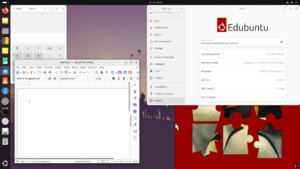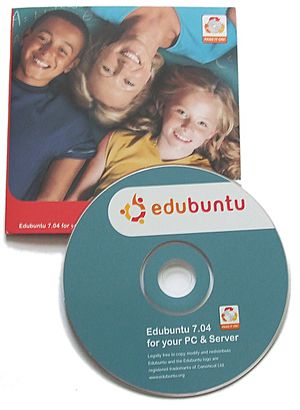Edubuntu facts for kids
Quick facts for kids Edubuntu |
|
|---|---|
 |
|

Edubuntu 24.04 Desktop
|
|
| Developer | Canonical Ltd. and community contributors |
| OS family | Linux (Unix-like) |
| Working state | Current |
| Source model | Open source |
| Initial release | 2005 |
| Latest release | 25.04 (Plucky Puffin) / 17 April 2025 |
| Repository |
|
| Kernel type | Monolithic Linux kernel |
| Default user interface |
GNOME |
| License | Mainly GPL and various others (free with some restricted components) |
Edubuntu is a special version of the Ubuntu computer system. It is made for use in classrooms, homes, and communities. It helps people learn and use computers easily.
What Edubuntu Does
Edubuntu is built on the regular Ubuntu system, which uses a desktop called GNOME. It comes with many programs chosen especially for students of different ages. These programs are grouped into folders for subjects like math, science, or art. An adult or teacher can also hide programs that are not needed.
In the past, Edubuntu included tools like Linux Terminal Server Project (LTSP). This allowed one computer to share its power with many simpler computers in a lab. It also had software for managing classrooms and controlling computer settings.
Why Edubuntu Was Created
The main goal of Edubuntu was to make it easy for teachers to set up a computer lab or an online learning space. They wanted teachers to be able to do this quickly, even if they were not computer experts.
Edubuntu was designed to help schools manage computers and users from one central place. It also aimed to make it easy for students to work together. A big part of its goal was to gather the best free software and learning materials for education. The creators wanted to build a system with all the best free educational programs that was simple to install and keep running. Edubuntu also helped schools with older computers use them more effectively.
Edubuntu Versions Over Time
The very first Edubuntu version came out in 2005. It was released at the same time as Ubuntu 5.10, which was called Breezy Badger. For a while, Edubuntu was not a separate system. Instead, it was an "add-on" CD that you could use to install Edubuntu programs on top of an existing Ubuntu system. But starting with version 9.10, Edubuntu became its own full system again.
After version 14.04, Edubuntu decided to only release new versions for Ubuntu's long-term support (LTS) releases. These LTS versions get updates for a longer time. However, for a few years, there were no new Edubuntu releases because not enough people were working on it.
In December 2022, it was announced that Edubuntu would return. It came back with Ubuntu 23.04. The new team focused on providing software and settings for different age groups, all built on the current Ubuntu desktop. The latest stable version is 25.04, released in April 2025.
See also
 In Spanish: Edubuntu para niños
In Spanish: Edubuntu para niños
- List of Ubuntu-based distributions
- Comparison of Linux distributions
- UberStudent – An educational Linux system based on Xubuntu
- Sugar-on-a-Stick – An educational Linux system based on Fedora


